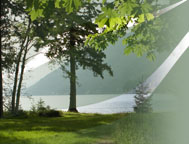PANENTHEISM: The Other God of the Philosophers
by John W. Cooper, 2006
This book is a review of one minor branch of western theology more popular with rational Philosophers than traditional Theologians. The author compares the evolution of the Panentheism (all-in-god) concept to the "classical" Theism doctrines (God as totally transcendent ). Cooper is a theologian in the Christian Reformed Church, which seems to be an American offshoot of the Dutch Reformed denomination, which in turn is similar to the Anglican Church in many ways: especially in their relatively liberal attitude toward biblical doctrine and modern Science. Both adhere to most of the creeds and confessions of the historical Catholic Church, even as they reject the Pope's authority. To his credit, the author makes his beliefs and bias clear from the beginning, and proceeds with an open-minded, scholarly, philosophical presentation of a belief system that he cannot accept, because it rejects some specific doctrines in the "revealed Word of God". I get the impression that his book was inspired as a refutation of the 2003 book, In Whom We Live and Move and Have Our Being, Panentheistic Reflections on God's Presence in a Scientific World.
My interest in the background of PanenTheism was primarily to shed some light on the history of European scientific & religious ideas that gradually interbred and eventually evolved into the current worldview/paradigm known to some as PanenDeism. The roots of those panentheistic ideas go back at least to Plato, but began to emerge in their modern form during the Scientific Enlightenment and the Protestant Religious Reformation in the 17th century. The author begins with this introduction:
<< When Pascal penned his famous warning against substituting the God of the philosophers for the God of Abraham, Isaac, and Jacob, he was addressing the Enlightened intellectuals of his time who rejected biblical revelation and the supernatural God of the Judeo-Christian tradition. The Deists and Baruch Spinoza are prime examples. They constructed theologies based on reason alone, not on supernatural revelation.>>
Cooper's problem with these developments was not the incorporation of scientific findings into theological understanding, but that Panentheistic beliefs did not include "God's redemptive dealings with humanity". He traces this error back to the "neopagan" corruption of theology in the early years of Christianity: . . . the history of panentheism is largely the history of Neoplatonism." Some of the non-Judaic (gentile, Greek) concepts include "The Great Chain of Being" and creation as a series of "concentric emanations" from God. Cooper also includes many other threads of religious history as essentially panentheistic: Greek Stoics, German Romantics, Hindus, Buddists, and animists, but his focus is on European Christianity.
He goes back to Plato's "God-world dualism" that was later incorporated into Plotinus' Neoplatonic "Great Chain of Being". One key concept is the "dialectic" process by which the "world-soul" emanated or evolved. Hence the inferences "that God is the unity of all dialectical opposition", and "that God is developing in and through the world". "God's progressive self-actualization" was at the core of Teilhard de Chardin's "Omega Point" theory of evolution as the means by which God reveals himself in the world. He also says that, "the term panentheism did not come into common usage until Charles Hartshorne popularized it in the mid-twentieth century".
Here's the "commonly accepted generic definition" :
<< The Being of God includes and penetrates the whole universe, so that every part exists in Him, but His Being is more than, and not exhausted by, the universe. In other words, . . . God transcends the world, but the world is in God ontologically". >> My definition: G*d is the whole of which the universe is a part.
Some other questions and comments from the introduction:
<< . . . God is ultimately personal and creates for the sake of interpersonal relationship.>> By way of mystical or psychical communication???
<< Could God exist without a world? >> Is creation a choice or a necessity?
<< The libertarian freedom of creatures to act, shape history, and affect God is a basic principle of modern panentheism. >> Freewill and a personal relationship?
Obviously PanenDeism has shed some of the specifically Judeo-Christian vestiges of PanenTheism. I may add some other notes as time allows, and as comments are posted.
